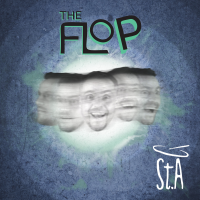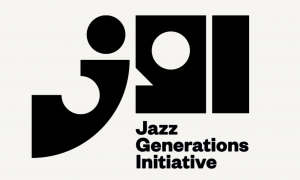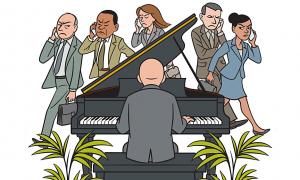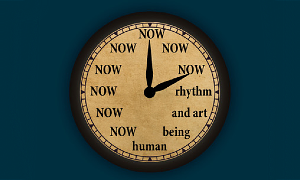File-sharing is the antithesis of big business. In everything from form (decentralized structure, minimal operation and upkeep costs) to function (duh), P2P networks and torrent hubs are diametrically opposed to the large corporate structures that define the entertainment and broadcast industries, and its proponents are proud of that.
But recently, the file-sharers have begun to act more and more business-like.
A couple weeks ago, we ran a piece about Paz, a rapper/singer from Los Angeles who used P2P networks to market his mixtape, Young, Broke and Fameless. From a numbers standpoint, the campaigns were successful. Paz's tape was downloaded over 200,000 times, but he didn't get a single byte of blog love, and to date he hasn't managed to turn those downloads into much of anything.
But Frostclick, one of the marketing services that helped promote Young, Broke and Fameless, did get something out of it. As the official marketing service of a P2P service called Frostwire, they got to add Paz's work to a growing catalog of free content that they promote both inside Frostwire and on Frostclick's homepage, part of a plan designed to differentiate them from their competitors.
I spoke with Kademlia, one of Frostclick's team members, about the service she provides, her thoughts on how file-sharing fits into the music industry's evolving ecosystem, and the new territory of marketing free music, and here's what happened.
Where did the idea for Frostclick come from?
There's thousands of talented content creators out there, however only a handful get to be signed by Record Labels, Publishing Houses and other Big Media distribution channels. As a result, the field is very uneven and the masses only have a chance to know but a fraction of all the great content they could be enjoying.
P2P file-sharing levels the field, scalable distribution costs are lowered to almost nothing, however p2p is still in it's infancy and people still don't know about all the free great content available to them. We decided to create a catalog with only world class content from Artists that accept the reality of content distribution in a digital society, content can be free, content can be used as their marketing expense. Put this catalog close to a peer to peer application and you have a great way to legitimize file sharing.
What do you mean when you say “legitimize"? As a means of acquiring or discovering content? As an alternative to the old system of paying for media?
We want to show that p2p is a great mechanism for free media distribution. Since file sharing has been vilified and historically associated with copyright infringements, the more organizations and artists utilize P2P to share their content, the faster p2p can become a wider spread distribution system. We think that as with every other new disruptive technology (cassette tapes, VHS, CD), users have to be educated on how p2p technologies can be used to legitimately distribute the content.
How many submissions have you received from artists or creators? Have you turned any down, and if so, why?
We haven't been keeping tabs on how many submissions we've received but let's say about 10 per month in average, we have turned down many, the reason is quality. Some content creators are not at a level where they can be introduced to hundreds of thousands yet. We have a list of clear requirements on our website, once a content creator passes these requirements they go through the team's “MP3 player test" (in the case of music submissions). If all the team is willing to carry that artists' music in their personal mp3 player that's a great sign other people will like it too.
On the one hand, I like the idea of an MP3 player test, but Frostwire is used by thousands of very different kinds of people. What makes the Frostwire team a good arbiter of taste for its users? Experience (and an obsession for all kinds of good music) and diversity. Some of us are musicians and DJs as well. In general, it doesn't take a genius to figure out in less than 10 seconds when an album is something extremely amateur or a professional quality production, with good voice, mix, style. The rest is personal taste. We realize not all releases will be liked by the majority of our users, but we try to do our best and promote only the content we feel 100% comfortable recommending. There are many releases that go through our doors that are amazing in their genre, but because they are to niche, they don't make it to FrostWire. In those cases we try to do a great post for them on FrostClick and promote them that way. This freedom to curate content, in opposition to charging for the space, keeps the content shown to the best interest of the community. We're doing this free and only because we love it, not because some crap artist with money paid for the promo.
I just logged onto Frostwire and there's nothing being promoted at the moment. Why don't you promote things on a daily basis?
Only the very best makes it to FrostWire, we don't want to waste FrostWire user's time with lame content. It also happens that sometimes our team of volunteers may not available to do all work related to a full blown promotion...
How do you see Frostclick fitting into the larger ecosystem of content promotion? Once we have enough content, FrostClick will become more than a catalog a directory and a searchable database of free content which will have deep integration with FrostWire and third party software/services. For now we're still getting to know others that are doing similar things to us, like Vodo.net, we support them through each one of their releases. Hopefully we'll be part of other distribution networks.
How do you ensure that the content Frostclick promotes will be targeted at the right audience?
Right now we don't. The operation is very simple, we just show one artist at the time hoping to give them as much attention as possible. However this question raises some ideas into FrostClick subscriptions, that way we could probably run smaller promotions for different niches.
I agree with your assertion that the old way of doing things, whereby “only a handful" reaped the benefits of big media distribution and promotion, was somewhat unequal, and gave an unfair advantage to corporate interests in particular. But when you refer to things like “the reality of content distribution in a digital society," it sounds like a dig against artists who want to sell their recordings, as though they are being naive in some way. Can both models—old (recordings as a significant stream of income for artists) and new (recording as “marketing expense")—coexist, or do you see the latter replacing the former?
I think both models can co-exist easily. Some artists give away their first album free and after they have made a solid name for themselves, they sell the following records. Others are allowing the customer to choose a price for their music. In many cases, artists have earned more using this model and self promoting than if they would belong to a record label. We have artists that give their album for free on FrostWire and who are also selling the very same album on Amazon and iTunes. If anything the exposition on FrostWire has made them sell more copies. There are all kinds of customers. There are people who won't pay for an album if they don't know the artist. They can download it free on FrostWire and if they like it, pay for it on iTunes or in other music stores. Some music fans refuse to pay for downloaded tracks, but spend lots of money on concert tickets and merchandise.
The industry needs to realize that not all business models apply everywhere. In most countries of Latin America, for example, it is impossible or very difficult to buy music/movies files online (lack of credit card culture, currency block issues, no disposable income...). Piracy takes over in those countries and actually makes money on illegal copies sold on the street. If the recording industry would realize that at least they could have some control over these regions, even if by giving the music for free as means of promotions for international tours or to advertise products with it, they would make a lot more money than currently.
I really want to have another conversation with Kademlia about this and other issues relating to file-sharing, but because this is such an enormous and complicated issue, I want to get some feedback from you guys. Please leave questions for our next chat in the comments.
But recently, the file-sharers have begun to act more and more business-like.
A couple weeks ago, we ran a piece about Paz, a rapper/singer from Los Angeles who used P2P networks to market his mixtape, Young, Broke and Fameless. From a numbers standpoint, the campaigns were successful. Paz's tape was downloaded over 200,000 times, but he didn't get a single byte of blog love, and to date he hasn't managed to turn those downloads into much of anything.
But Frostclick, one of the marketing services that helped promote Young, Broke and Fameless, did get something out of it. As the official marketing service of a P2P service called Frostwire, they got to add Paz's work to a growing catalog of free content that they promote both inside Frostwire and on Frostclick's homepage, part of a plan designed to differentiate them from their competitors.
I spoke with Kademlia, one of Frostclick's team members, about the service she provides, her thoughts on how file-sharing fits into the music industry's evolving ecosystem, and the new territory of marketing free music, and here's what happened.
Where did the idea for Frostclick come from?
There's thousands of talented content creators out there, however only a handful get to be signed by Record Labels, Publishing Houses and other Big Media distribution channels. As a result, the field is very uneven and the masses only have a chance to know but a fraction of all the great content they could be enjoying.
P2P file-sharing levels the field, scalable distribution costs are lowered to almost nothing, however p2p is still in it's infancy and people still don't know about all the free great content available to them. We decided to create a catalog with only world class content from Artists that accept the reality of content distribution in a digital society, content can be free, content can be used as their marketing expense. Put this catalog close to a peer to peer application and you have a great way to legitimize file sharing.
What do you mean when you say “legitimize"? As a means of acquiring or discovering content? As an alternative to the old system of paying for media?
We want to show that p2p is a great mechanism for free media distribution. Since file sharing has been vilified and historically associated with copyright infringements, the more organizations and artists utilize P2P to share their content, the faster p2p can become a wider spread distribution system. We think that as with every other new disruptive technology (cassette tapes, VHS, CD), users have to be educated on how p2p technologies can be used to legitimately distribute the content.
How many submissions have you received from artists or creators? Have you turned any down, and if so, why?
We haven't been keeping tabs on how many submissions we've received but let's say about 10 per month in average, we have turned down many, the reason is quality. Some content creators are not at a level where they can be introduced to hundreds of thousands yet. We have a list of clear requirements on our website, once a content creator passes these requirements they go through the team's “MP3 player test" (in the case of music submissions). If all the team is willing to carry that artists' music in their personal mp3 player that's a great sign other people will like it too.
On the one hand, I like the idea of an MP3 player test, but Frostwire is used by thousands of very different kinds of people. What makes the Frostwire team a good arbiter of taste for its users? Experience (and an obsession for all kinds of good music) and diversity. Some of us are musicians and DJs as well. In general, it doesn't take a genius to figure out in less than 10 seconds when an album is something extremely amateur or a professional quality production, with good voice, mix, style. The rest is personal taste. We realize not all releases will be liked by the majority of our users, but we try to do our best and promote only the content we feel 100% comfortable recommending. There are many releases that go through our doors that are amazing in their genre, but because they are to niche, they don't make it to FrostWire. In those cases we try to do a great post for them on FrostClick and promote them that way. This freedom to curate content, in opposition to charging for the space, keeps the content shown to the best interest of the community. We're doing this free and only because we love it, not because some crap artist with money paid for the promo.
I just logged onto Frostwire and there's nothing being promoted at the moment. Why don't you promote things on a daily basis?
Only the very best makes it to FrostWire, we don't want to waste FrostWire user's time with lame content. It also happens that sometimes our team of volunteers may not available to do all work related to a full blown promotion...
How do you see Frostclick fitting into the larger ecosystem of content promotion? Once we have enough content, FrostClick will become more than a catalog a directory and a searchable database of free content which will have deep integration with FrostWire and third party software/services. For now we're still getting to know others that are doing similar things to us, like Vodo.net, we support them through each one of their releases. Hopefully we'll be part of other distribution networks.
How do you ensure that the content Frostclick promotes will be targeted at the right audience?
Right now we don't. The operation is very simple, we just show one artist at the time hoping to give them as much attention as possible. However this question raises some ideas into FrostClick subscriptions, that way we could probably run smaller promotions for different niches.
I agree with your assertion that the old way of doing things, whereby “only a handful" reaped the benefits of big media distribution and promotion, was somewhat unequal, and gave an unfair advantage to corporate interests in particular. But when you refer to things like “the reality of content distribution in a digital society," it sounds like a dig against artists who want to sell their recordings, as though they are being naive in some way. Can both models—old (recordings as a significant stream of income for artists) and new (recording as “marketing expense")—coexist, or do you see the latter replacing the former?
I think both models can co-exist easily. Some artists give away their first album free and after they have made a solid name for themselves, they sell the following records. Others are allowing the customer to choose a price for their music. In many cases, artists have earned more using this model and self promoting than if they would belong to a record label. We have artists that give their album for free on FrostWire and who are also selling the very same album on Amazon and iTunes. If anything the exposition on FrostWire has made them sell more copies. There are all kinds of customers. There are people who won't pay for an album if they don't know the artist. They can download it free on FrostWire and if they like it, pay for it on iTunes or in other music stores. Some music fans refuse to pay for downloaded tracks, but spend lots of money on concert tickets and merchandise.
The industry needs to realize that not all business models apply everywhere. In most countries of Latin America, for example, it is impossible or very difficult to buy music/movies files online (lack of credit card culture, currency block issues, no disposable income...). Piracy takes over in those countries and actually makes money on illegal copies sold on the street. If the recording industry would realize that at least they could have some control over these regions, even if by giving the music for free as means of promotions for international tours or to advertise products with it, they would make a lot more money than currently.
I really want to have another conversation with Kademlia about this and other issues relating to file-sharing, but because this is such an enormous and complicated issue, I want to get some feedback from you guys. Please leave questions for our next chat in the comments.

























